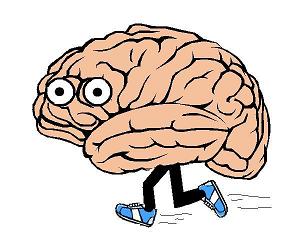The brain
is amazing and complex - but our lack of understanding has led to a great
variety
of myths
throughout the years. Like "bigger is better". While this may be true
for some other organs - you only need to look at a sperm whales brain, which is
nearly 6 times larger than a human's, to seethes myth fall apart. Yes, they're
certainly intelligent animals, but their cognitive skills pale in comparison to
our own. Had a fun night out? Don't worry, alcohol doesn't actually kill your
brain cells. Although it does cause damage and creates problems conveying
messages between neurons, the damage is mostly reversible. Similarly, drugs
don't actually create holes in your brain. Though some can permanently change
your brains functionality and structure, the only thing that can put a hole in
your brain is physical trauma.
Good
thing you have 100 billion brain cells - or not. Surprisingly, it wasn't until
2009that scientists discovered the true number to be closer to 86 billion. Sure
it may seem like a small difference, but those 14 billion neurons are equal to
the size of an entire baboon brain. To further put those numbers in
perspective, consider that 1 million seconds is 12 days, while 1 billion
seconds is 31 years. So that 14 billion neuron difference may not be so small
after all.
Regardless,
we can't use them all, right? Most movies and sci-fi books have us believe that
humans can only use around 10% of our brain... which is absolute nonsense. Thanks
to modern brain scanning technology, we know that we use the whole thing - all
the time! Not necessarily all at once - when you're walking, for instance, the
parts of the brain associated with movement are more active than other areas.
However, there is no part of the brain that simply doesn't do anything. It
represents 3% of the bodies weight and uses 20% of its energy. That's a busy brain!
But we generally use one side more than the other, right? Nope! While you may
have been convinced that if you're more logical or analytical, you're more
'left brained' and if you're more creative or intuitive you're 'right brained'
it's simply not true. While different sides of the brain are indeed used for
specific functions - for example, language uses the left hemisphere while the
right hemisphere helps to read emotion - studies on thousands of individuals
have found no evidence of a left or right dominance in individuals. Another
words, you use both sides equally. And you don't actually have 5 senses like
you were always told - in fact, you have a lot more! Like nociception which is
the sense of pain, or proprioception, the sense of how our bodies are
positioned. Not to mention sense of balance, temperature and passing of time.
Scientists at GE's Global Research Centres are collaborating with top
researchers and institutions to uncover new insights about the brain's
functionality. If you're interested in debunking more myths or understanding
more about the brain, you can follow their progress at GE Reports, as they work
together to crack the brain's greatest mysteries.




